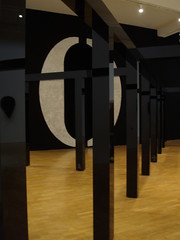Here's why I love economics.
During the last month, I was trying to explain the difference in agricultural policies between East Asian and Sub-Sahara African dictators: East Asians have promoted agricultural growth while Africans have screwed it up. We have seen this difference despite their similarities in terms of per capita income in the early 1960s, the political trajectory until the early 1990s (both regions were ruled by more or less non-democratic governments), and the motivation to promote industrial development on the part of the government.
My intuitive reasoning was this: a non-democratic government faces a trade-off between maximizing tax revenues and preventing citizens from undertaking insurgencies. Taxing both agricultural and non-agricultural sectors in a similar fashion allows the government to collect as large tax revenues as possible. On the other hand, this leads to citizens in the agricultural sector identifying themselves with those in the non-agricultural sector, and vice versa, in their relationship with the government. Therefore, citizens as a whole have a high incentive to threaten the government with insurgencies in order to demand less taxes.
Taxing two sectors in a different way, on the other hand, certainly reduces the amount of tax revenues but reduces the insurgency incentives for citizens as well. This is because citizens in the less heavily taxed sector do not identify themselves with those in the more heavily taxed sector, and therefore do not cooperate with them if heavily taxed citizens decide to take up arms against the government. This makes an insurgency more costly for the heavily taxed citizens. If the government follows this strategy, it wants to tax agriculture more heavily because taxable incomes are larger in the agricultural sector, at least, in the early stage of economic development (as was the case in the early 1960s for both East Asia and Sub-Sahara Africa).
The differential taxation is more desirable for the government if the loss of tax revenues due to this tax strategy is small. This is the case if there is a huge difference in taxable incomes between the two sectors. In many African countries, agriculture provides far more taxable incomes than non-agriculture as soil and climate conditions allow them to produce export cash crops such as cocoa and coffee. This leads to African dictators severely taxing agriculture while favouring industries. In East Asia, however, agriculture does not yield particularly high incomes relative to the other sector in the economy. This makes East Asian dictators to treat both agriculture and non-agriculture in a similar way (ie. promoting productivity growth by not destroying production incentives due to heavy taxation).
That was my speculation. Based on this idea, I worked on building a model showing this logic in a mathematically rigorous way. It turned out, however, that the above reasoning had a flaw in it. A mathematical model allowed me to realize that if agriculture is far more profitable than non-agriculture, then citizens in the non-agricultural sector are never willing to oust the government even if they are taxed as heavily as those in agriculture. This is because their gain from toppling the government (the amount of incomes taxed away) is small (their taxable income is small by assumption) while the cost of insurgency is independent of the size of taxable incomes. In this situation, therefore, only citizens in the agricultural sector have an incentive for insurgencies. Removing the tax burdens on non-agricultural citizens does not weaken insurgency incentives for agricultural citizens (they need to oust the government on their own anyway), only to reduce the amount of tax revenues. Therefore, the government never chooses the differential taxation as its optimal policy.
I couldn't have noticed this logical flaw if I hadn't tried to build a mathematical model. Your intuition can tell a lie while mathematics never does. This is why I love the way economists engage in theoretical analysis.
This love affair does not mean that I make progress in my research, though.



